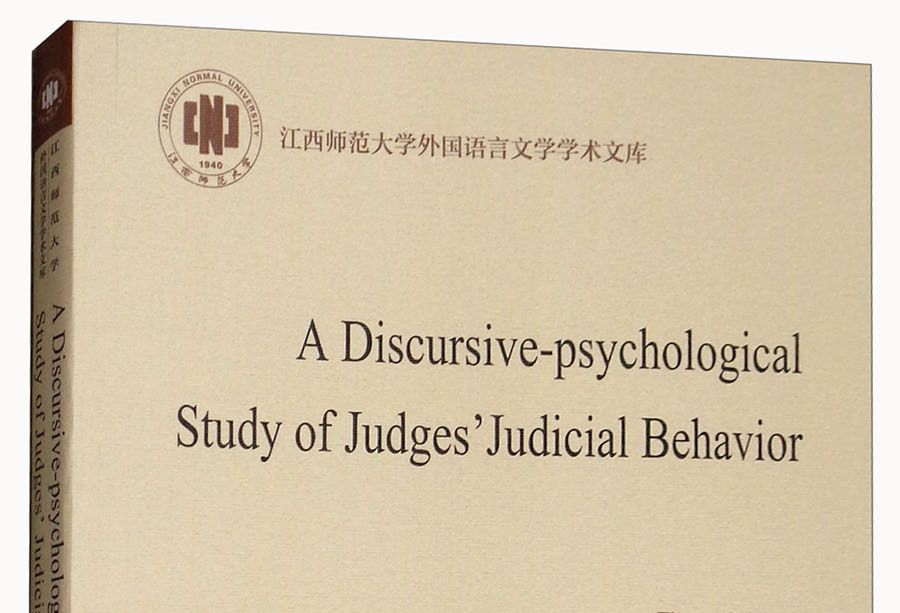《法官司法行為的話語心理學研究(英文版)》是2017年12月中國社會科學出版社出版的圖書,作者是鐘彩順。
基本介紹
- 書名:法官司法行為的話語心理學研究(英文版)
- 作者:鐘彩順
- 出版社:中國社會科學出版社
- 出版時間:2017年12月
- 頁數:233 頁
- 定價:66 元
- 開本:16 開
- 裝幀:平裝
- ISBN:9787520316484
- 版次:1
內容簡介,作者簡介,圖書目錄,
內容簡介
This book adopts a discursive psychological approach to judges'judicial behaviors. Based ona close scrutiny ofjudges' discursive actions, this research argues that judges do not adjudicate merely by law, but also by what they care about as a social being. Their care structure is manifested in their discourse, situated and transportable identit:ies performed in their moment——to-m,oment institutional discourse practice. What sets this research apart from other identitv-related theorizations is that identity here is not regarded as the factor determining judges' judiaal behavior but the resources judges mobilize to Iegitimatize or rationalize their discursive actions. This theory reonentation can highlight the dynamic tension between structure and contingency in judicial practice and shed lights on the instrumentali.ty and temporality of judges' judicial behavior. Given this,legal concepts such as ‘justice' , ‘kcticity' , ‘legitinacy',etc.are also subject to respecification.
作者簡介
Zhong Cai-shun is currently a lecturer in Jiangxi Normal University. He has been working there since 2005 after he obtained his master degree from Zhejiang Normal University.From 2006 to 2009, he proceeded to pursue his PhD degree in Guangdong University of Foreign Studies, where he received his academic training in forensic linguistics. He did research on forensic phonetic science as a visiting scholar at the University of York during 2015-2016. He has so far published more than 20 research papers and one monograph. He is now a member of the specialized Forensic Linguistics council in China's Association of English and Chinese Comparative Research. His research interests include legal discourse analysis, forensic speaker identification and sociophonetics.
圖書目錄
Chapter 1 Introduction
1.1 Background to the Study
1.2 Purpose of the Study
1.3 Theoretical Assumptions of the Study
1.4 Research Questions
Chapter 2 Literature Review
2.1 Judges' Institutional Roles
2.1.1 Judges' Varying Roles Under Different Judicial Systems
2.1.2 Jurisprudential Definitions of Judges' Role
2.1.3 Judge under China's Constitution
2.2 Judicial Behavior Research
2.2.1 Cognitive-psychological Approach to Judicial Behavior
2.2.2 Sociological Approach to Judicial Behavior
2.2.3 The Discursive Turn in Judicial Behavior Research
2.3 Discursive Psychology
2.3.1 Accounts of Course of Action
2.3.2 Accounts of Mind
2.3.3 Accounts of Identity
2.4 Summary
Chapter 3 Theoretical Framework and Method
3.1 Respecifying Judicial Behavior
3.2 Concept and Assumption
3.2.1 Discourse
3.2.2 Discursive Action Model
3.3 Theories of Discursive Actions
3.3.1 Speech Act Theory
3.3.2 Exchange Structure Theory
3.3.3 Linguistic Anthropology
3.4 A Theoretical Framework
3.4.1 Characterizing Discursive Actions
3.4.2 Identifying Identity
3.4.3 Configurating Judicial Discourse Order
3.5 Method
3.5.1 Dataset
3.5.2 Data Analysis
Chapter 4 Discursive Enactment of Judges' Judicial Behavior
4.1 Introduction
4.2 Framing Judicial Trial
4.3 Judges' Discursive Actions
4.3.1 Coordinative
4.3.2 Inquisitive
4.3.3 Representative
4.3.4 Attributive
4.4 Summary
Chapter 5 Judges' Identity Performance in Discursive Actions
5.1 Introduction
5.2 Self-identifying
5.3 Discourse Identities
5.3.1 Initiator
5.3.2 Evaluator
5.4 Situated Identities
5.4.1 Procedure Organizer
5.4.2 Fact Investigator
5.4.3 Order Maker
5.5 Transportable Identities
5.5.1 Justice Doer
5.5.2 Officialdom
5.5.3 Social Member
5.6 Summary
Chapter 6 The Ontology of Judicial Behavior
6.1 Introduction
6.2 Disparity in JJB
6.2.1 Procedure-oriented vs.Substance-oriented
6.2.2 Authority vs.Solidarity
6.2.3 Paradigmatic vs.Narrative
6.3 The Ontological Structure for JJB
6.3.1 Heideggerian Theory of Being
6.3.2 Judges' Caring and Knowing
6.3.3 Summary
Chapter 7 Conclusion
7.1 Introduction
7.2 Summary of the Research
7.3 Major Findings
7.3.1 Discursive Characterization of Judicial Behavior
7.3.2 Judges' Epistemological Positioning
7.3.3 An Ontological Account of JJB
7.4 Implications
7.4.1 Discursive Construction of Justice
7.4.2 Possibility for Judicial Reform
7.4.3 Critical Discourse Awareness
7.5 Limitations and Suggestions for Further Research
References
Appendices

